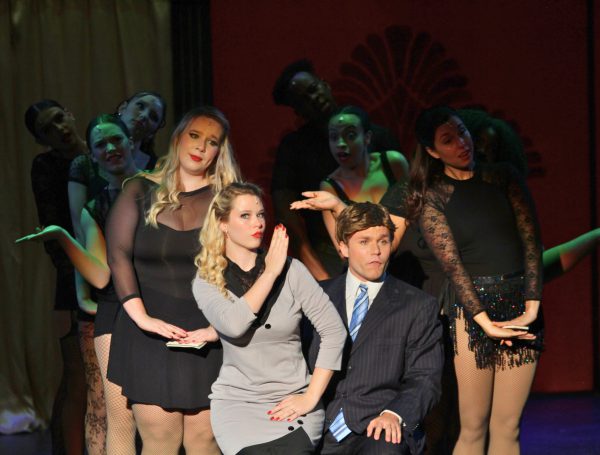Sophomore Stephanie Clark, Senior Rob Lindsay and ensemble performing “We both reached for the gun” on Oct. 5.
McKenna Howenstine|Marlin Chronicle
The long-running musical comes to VWU with Vaudeville influences and a scathing critique of the justice system.
“Oh!” Roxie Hart, played by sophomore Stephanie Clark, exclaimed, her shiny pink robe fluttering in the bright stage lights. “I gotta pee!”
The audience broke into laughter as she ran off the stage, prop gun still clutched in hand and the lover she’d shot left laying center stage. That was only one of many surprising, darkly funny moments featured in “Chicago.”
The Susan S. Goode Fine and Performing Arts Center performed “Chicago,” a 1975 musical about the 1920s legal scene, from Thursday, Oct. 3, through Sunday, Oct. 6. The show is a dark satire about celebrity trials and 1920s culture.
Dr. Travis Malone, professor of Theatre and the Anne B. Shumadine Dean of the Batten Honors College, said that the musical was selected for its artistic variety and merit. Malone, the director, added that “Chicago” is one of his favorite productions.
“It’s one of those really important pieces,” Malone said. “Everyone loves it because it’s dark and because it’s cynical, and it sort of embraces this cynical side of American culture.”
According to the New York Theatre Guide, “Chicago” is based on the investigative journalism and 1926 play of the same name by Maurine Dallas Watkins. The “Chicago” musical was written by popular writer Bob Fosse with music by John Kander and lyrics by Fred Ebb. The musical follows the exploits of two burlesque performers, Velma Kelly and Roxie Hart, as they fight for fame during the jazz age.
Clark, who plays Roxie Hart, spoke to some of the distinct elements of “Chicago.”

McKenna Howenstine|Marlin Chronicle
“The whole thing is kind of like Roxie seeing a show–like it’s a show in her mind,” Clark said. “It demonstrates how much everything in the world can be an act.”
In that theme, “Chicago” incorporates a typical cultural element from the American jazz age: vaudeville. Vaudeville was a cultural phenomenon of the jazz age where everything from cross-dressing to undressing was shown on stage. And rather than a traditional theatrical show, which follows a clear narrative with songs that add upon that story, “Chicago” incorporates another hallmark of vaudeville: a varied, more split narrative.
“Almost the whole half of the first act is character after character introducing themselves to the audience through a song,” Malone said. He explained how vaudeville and burlesque shows are comprised of multiple acts that didn’t necessarily connect, and that “Chicago” follows that style.
“These are all different kinds of acts, but in some respect, we get pulled into the narrative of the story,” Malone said.
Indeed, almost every song in “Chicago” was introduced by one of the many vibrant characters dressed in tight, glitzy outfits or even by the conductor of the live orchestral pit.

McKenna Howenstine|Marlin Chronicle
“I’ve never been to a school production with a live band,” sophomomore Madeline Diaz said. “That was really cool.”
The orchestral pit, led by conductor Ajee Church, was a mix of VWU students and community members who played live accompaniments for the show. This was another part of the unique experiences of bringing “Chicago” to VWU that both Malone and Clark spoke to.
“I’ve never had an experience like this,” Clark said. “I’ve never performed with live music or practiced on a stage for most of the time.”
“This is one of our more challenging productions we’ve taken on. It’s the biggest production in the shortest amount of time,” Malone said. The open call casting for “Chicago” took place Aug. 28 and 29, leaving roughly four and a half weeks to prepare and produce the show. In order for the show to be a success, the cast committed to an intensive rehearsal schedule.
“We have amazing, amazing actors that are really crushing it right now,” Malone said. “They come in ready to work, ready to embrace the process and ready to put on a good show for everyone.”
Clark echoed his sentiments.

McKenna Howenstine|Marlin Chronicle
“I really do like this cast, because they’re all professional, and they take their job seriously,” Clark said. Clark stated her appreciation for both the cast and crew for their commitment and dedication to the show, while also still having fun.
This was Clark’s first major production with the VWU theatre department, although she has several years of acting experience within her own community. Last spring, Clark was also a part of a student-directed production at VWU. She described the difference between previous productions and “Chicago” as having more collaborative influence.
“I think he’s really a good director because he kind of gives you an idea,” Clark said, in reference to Malone.
She stated that he gave her ideas and let her have more creative control over her character, and she likes working with him.
“I think it takes a special approach to acting in a musical that is different than ‘Anastasia’, so that then gives [the cast] a chance to sort of really, really think about acting and performance,” Malone said.
On opening night, the Goode Center was filled with students, faculty, family members and more who excitedly watched the two and a half hour production.
“This is the first school production I’ve ever seen,” Diaz said. “I’m glad I came out tonight.”
Miguel Hernandez, a senior, agreed with Diaz’s statements.
“They had a lot of passion,” Hernandez said. “I can really tell that they’ve been working hard.”
Both Diaz and Hernandez watched “Chicago” mainly to support their friends in the cast, but said that they enjoyed the show. The 18-person cast’s hard work paid off, bringing a lively, exciting production with cultural value to VWU for the 2024 Homecoming Weekend.
“The audience loves her,” the ensemble sang, surrounding Clark near the end of Act I as she performed the song “Roxie.”
“And I love the audience” Clark sang, sashaying across the edge of the stage and waving to the audience. The cheered response seemed to agree as she continued the verse, ending with a smirk while saying,
“And that’s show biz, kid.”
By Gabrielle Barnett
gabarnett@vwu.edu


